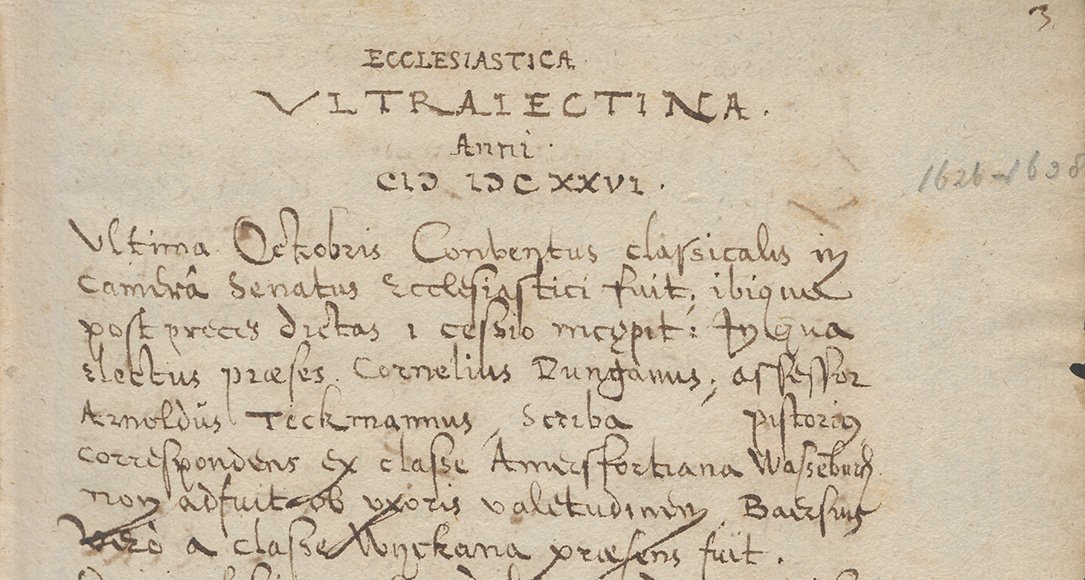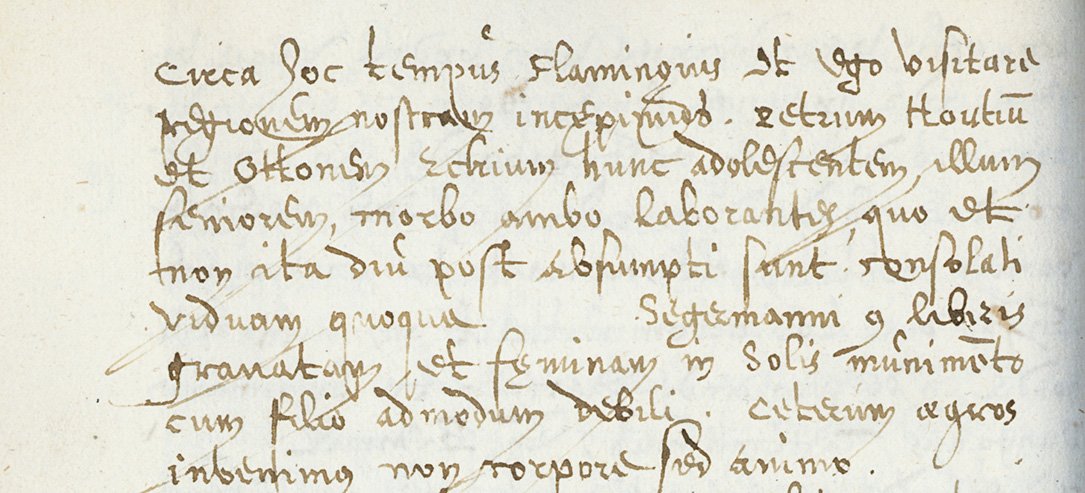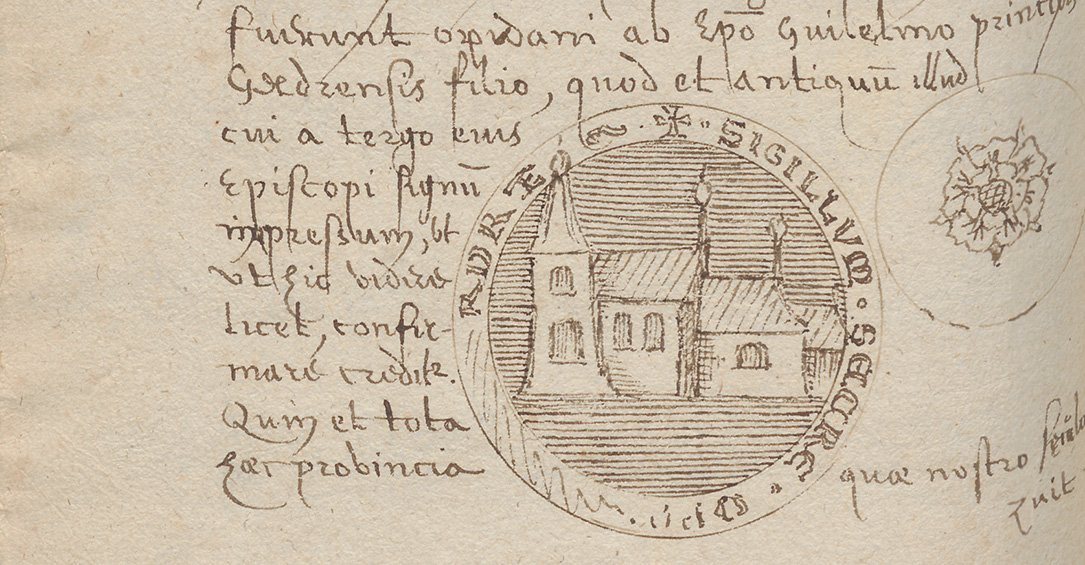'Observationes & Ecclesiastica' by Aernout van Buchell
Buchelius as church elder
In 1622 Aernout van Buchell also known as Arnoldus Buchelius (1565-1641) was chosen as church elder of the Reformed church in Utrecht. As was his habit, he noted down his daily experiences. He reports routine transactions, such as baptisms and marriages, and the sermons he had heard. In addition the tells us about fights, jealousy, scandals, charity and stormy house calls. In this way Buchelius gives a unique and fascinating picture of the daily church practice between 1620 and 1630 against the backdrop of the Eighty Years’ War (Dutch Revolt).
A reluctant church elder
In 1622 Buchelius was asked to take office as a new church elder. There were eight church elders in total. Each year four were appointed for a two-year period. With great reluctance he accepted the nomination which kept him away from his historical research. By then Buchelius was already 57 years old, but once he had taken up his duties he became closely involved with the work of the church council. As a conscientious historian he noted down everything he deemed of importance, much of which did not end up in the official reports of the church council. Buchelius served two times a two-year period as church elder (1622-4 and 1626-28) but his notes also cover the period in which he was not in office, up to 1639.

Reformed Utrecht
In 1580 the city council had switched to Protestantism, but not all citizens agreed with this decision. In his younger years Buchelius was still a Catholic, but around 1595 he joined the Reformed Church and eventually became one of the pillars of the Reformation in Utrecht (Pollmann 2000, 126-127). As a church elder of the Utrecht city council he was also delegated to the classis of Utrecht (the city and the western province) and even to the provincial synod.
The church council
As an elder of the church council Buchelius had to co-organise baptisms, communion, sermon schedules and the educational system, settle disputes among members of the congregation, and help, admonish, suspend or, if necessary, remove sinners. He also made house calls, for instance to summon people to participate in communion for the whole congregation which took place four times a year. To this purpose they had to be free of sins, and this regularly caused problems which he often noted down in detail. Buchelius is critical about how certain daily affairs were regulated, and shows his interest in for instance education and poor relief (during this period he was also a trustee of the Utrecht House of Correction).
Usual and unusual stories
There is no better way to give an idea of the things Buchelius noted down than to cite a few entries in translation. It is a rather random selection from the months October and December 1622, and February and March 1623. In some cases Buchelius gives a more detailed description than is rendered here:
Rebellious women
In the house of the forester, [Eernst van Reede], which was unoccupied and was rented by [Wilhelmina van Wachtendonk], mistress of Oyen, Remonstrants had organised a meeting in the evening without the knowledge of the city council, or so it seems, The bailiff caught them and they were fined according to the statutes. There were a few rebellious women present who made an awful racket, like Levina [van Westhuysen], the landlady of the Zwarte Klok, and the wife of the dismissed clergyman Van Zijl. Due to the impudence of these women and the indifference of the Court all went unpunished. [Wed 9-10-1622]
Idolatry
A house search was held in the beguinages, and some saint’s figures were taken away. But it is no use against popery and idolatry, because these retreats, in which idolatry is kept and cherished, are left as they are [Mon 28-10-1622]
Dancing at a wedding
Mention is made of dancing at the wedding of our nephew Van Wijkersloot, where Frederique van Brienen was pulled along to dance, as well as the sisters of secretary Van Hilten. Nonetheless they had, against the rules, participated in communion, but when it was told how it had happened and that they were sorry, the affair was settled [Wed 11-12-1622]
House calls
Around this time Flaman and I have begun with house calls in our neighbourhood. We have comforted Pieter van Houten en Otto van Eck, the latter still young, the first an elder man. They had both taken ill, and died soon after. We also comforted the widow of [Jan] Segerman who is left with nine children, and a woman with a seriously ill son [Wed 11-12-1622]
Group boozing
A baker from the Twijnstraat complained about Reyer Willemsz, master of the House of Correction. The fact of the matter is that the baker said that Reyer came to his house at night to booze, a few times together with his wife and sometimes with Pieter Christiaensz, who was in that house to mend his ways, and he was responsible for that Pieter. [Wed 11-12-1622]
The old man and the maid
In the afternoon 14 or 15 couples wanted to register their intended marriage, including Hendrik Jorisz van Stamhorst, an old man over 60, grey-haired, widower, with Beliken Peters van Grave, a girl of 18 years old. She was his maid and he admitted that they had already lived in concubinage wife for six weeks. And when he was punished because, being of such old age, he incited this marriage so indecently, he said that he thought he was acting well because he married the girl in all honour and decency. [Sat 8-2-1623].
A poor Hungarian student
There was read a request by a young man, called Michael Corvinus from Kremnitz in Hungary, who studied Theology in Heidelberg and was robbed there of his books and other belongings. When he had arrived in Leyden, he asked for support to continue his studies, because his parents were penniless due to the Hungarian wars. And now he had also lost his income, in particular from educating some youngsters. He also showed proof of membership of the Reformed church or a certificate from Daniël Heinsius, secretary of the University of Leyden. The student received as answer that we would give him some travelling money, and if he could show study results in due course, we would consider giving him a study allowance. [Fri 14-2-1623].
Poor relief
The church council has met. The concept that I have drawn up on the basis of the draft of the deacons to improve the conditions of the poor, has been read. And although it was met with approval, mayor Van der Lingen and reverend Langius objected against the changes. They thought that the sums of money for the poor, for this year anyway, had already been increased considerably. [Tue 4-3-1623]
The fake student and clergyman
Someone appeared who showed proof of membership of the church dating a few years back coming from the reverends Gomarus and Festus Hommius, in favour of Johannes van Zijl, student of Theology. He made a request for an allowance, because he wanted to go to war. But I remembered that he had been introduced to the East Indies Company a while back, which had given him an allowance for some time with the intention of sending him to the East Indies as a clergyman. That is why it crossed my mind that he had not been behaving very well of which a certain rumour had reached me. I told him so and because he had little to say in his defence, his request was rejected. The day before this guy (I still doubt whether it is the same or someone else), with a message from the rector and posing as the son of a clergyman driven from the Rhineland, had asked my wife for travelling expenses. But she refused, saying that she did not know him. He had better turn to those whom he could present with the necessary proof about his circumstances, for instance the church council or the deacons, she said. But then he began to curse terribly, wished her all kinds of harm, and walked out of the house. That we give such people, often with high hopes, an education, causes a lot of misery in our church [ Wed. 12-3-1623].
Fallen bishop
The statue of the bishop on the tomb in front of the room where the church council meets [the statue on the still existing tomb of bishop Guy van Avesnes in the Dom church] that had once been thrown over, has been found. Rumour has it that a few deacons are the culprits. [Wed. 12-3-1623].
The two manuscripts: Observationes en Ecclesiastica
Buchelius wrote down his vicissitudes in a notebook that was still largely empty. At the beginning we find the Monumenta quaedam (Leeuwarden, Tresoar, Hs. EVC 3373A), his description of monuments in the northern provinces which have been published online by now. The largest part of the manuscript, fol. 35-158, now contains the Observationes ecclesiasticae sub presbyteratu meo (Church affairs, noted down during my years as church elder). When it was full after four years (1622-1626) he continued in another empty book, the Ecclesiastica Ultraiectina (Utrecht church affairs) (Utrecht, University Library, Ms. 1053 (5 H 10)), and this report covers the years 1626 up to 1639 (fol. 3r-118r en 187v). However, both texts form a whole, and are reunited virtually on this website.

The edition and translation by Kees Smit
In 1887 the Utrecht archivist Samuel Muller Fz. published an extensive anthology (with a few footnotes) of the Observationes, without a translation of the mixed Latin and Dutch texts. The manuscript of the Ecclesiastica was not edited. In 2009 Kees Smit started on a complete edition and translation of both the Observationes and the Ecclesiastica, which was completed in 2011. The edition and translation (498 pp.) are abundantly supplied with footnotes in which many names are specified, and are preceded by an extensive introduction on being a church elder. This edition is of great value to historians interested in the history of the Reformation, in personal history, or in the history of the city of Utrecht, but also to genealogists and other researchers.




